I’ve been lurking on Pinterest and getting increasingly annoyed at how bad the skincare advice is on there – it’s a serious challenge to find a pin that doesn’t have something inaccurate on it! So I decided to create my own science-based skincare tips that you can pin to dilute the usual “rub these foods on your face to cure stuff that can’t be cured, even with surgery – oh, and these might burn but beauty is pain and it’s natural, so it’s good for you!”. (Yeah, I’m just a tad salty.) If you’re a regular reader of my blog or if you follow me on Instagram, you’ll probably know these skincare tips already, but it’s always nice to have a refresher! I’ve also linked relevant posts for each tip, if you’d like to find out more.
It Doesn’t Take Much Sun to Age Your Skin
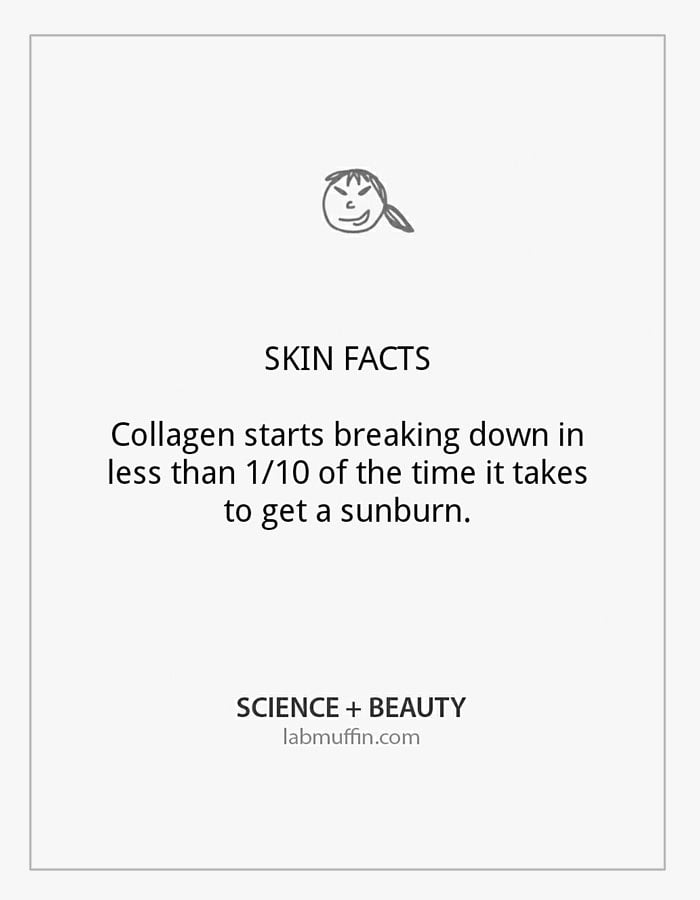
Scary fact of the day: even if you haven’t gotten burnt, you still might have had enough sun exposure to cause permanent damage! 1/10 of the UV required to cause sunburn (also known as the erythemal dose) will be enough to activate the enzyme MMP-1, which breaks down collagen. Collagen is an important protein in your skin that gives it its bounciness – loss of collagen from natural aging and sun exposure is one of the main reasons for rough skin texture and wrinkles. The solution: wear sunscreen daily, and practice sun avoidance – cover up with clothes, wear a hat, and seek shade, especially in the middle of the day when UV is at its strongest. (And if you need sun, find a part of your body you’re willing to sacrifice!)
Related posts:
- Sun protection basics
- Beach survival kit: sun protection essentials
- Why you should protect yourself from UVA
Yes, Oily Skin Can Need Moisturiser!
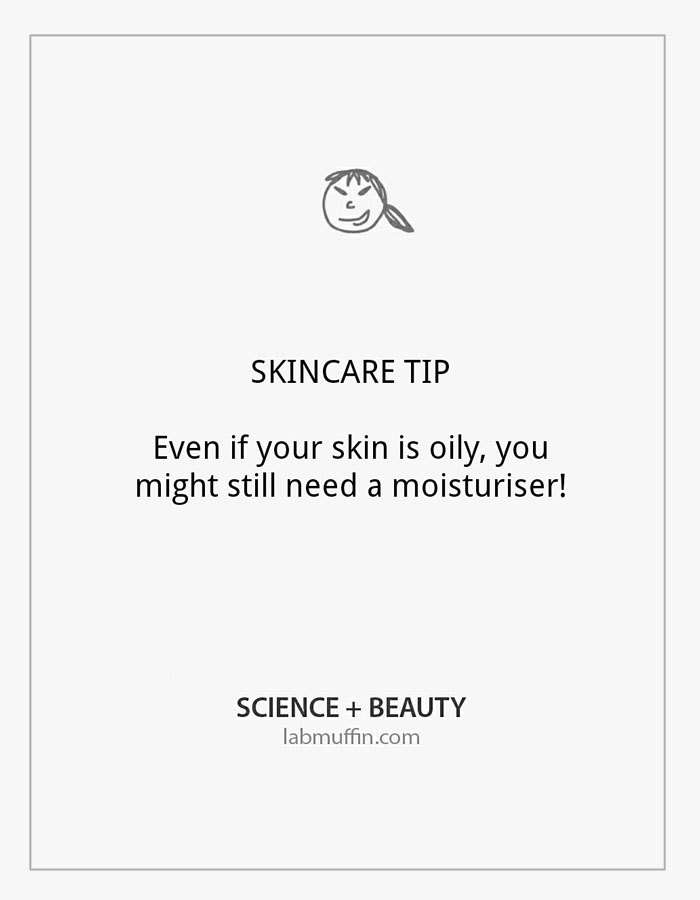
Oily skin produces more sebum, your skin’s natural moisturising oil, than dry skin. This means it’s less likely to need moisturiser, but unfortunately oily skin is not immune to dehydration, when it doesn’t have enough water. If your skin is oily but feels tight, your skin is probably dehydrated – you’ll need a hydrating moisturiser containing humectants like glycerin to help your skin hold onto water.
Related posts:
- Is Your Skin Dry or Dehydrated? And How to Treat It
- Humectant Waters and Sprays: A Quick Fix for Dehydrated Skin
Overcleansing Is Bad for Skin
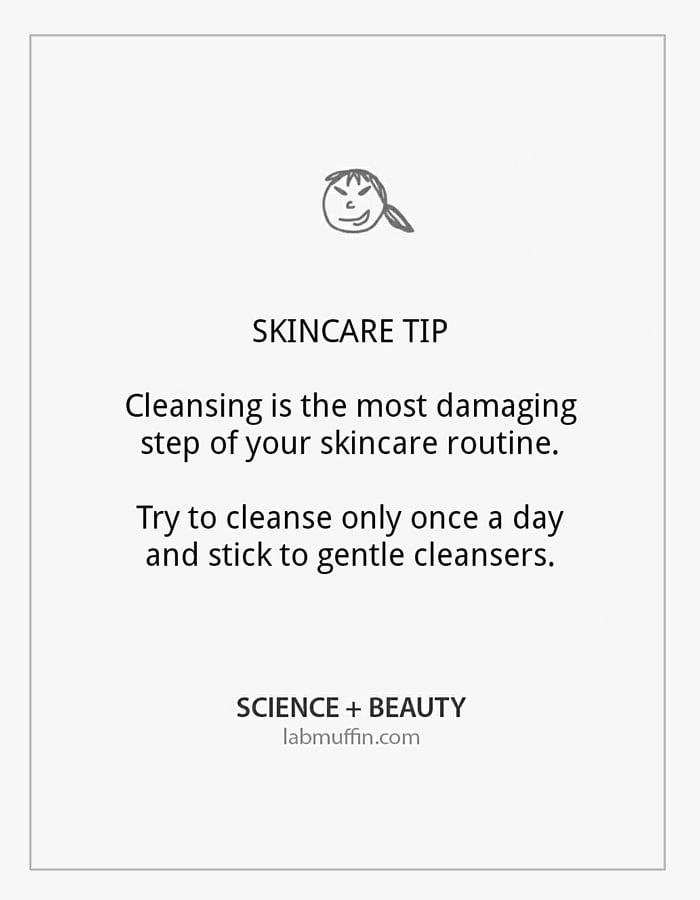
Washing grime off your face feels great, but cleansing is one of the few steps in your skincare routine where you’re purposely putting harmful chemicals on your skin – namely, surfactants. Surfactants are the active ingredients in cleansers which lift off dirt and oil, but they also swell up proteins and remove protective oils from your skin. Sometimes a solid scrubbing is unavoidable, but minimal, gentle cleansing is much better in the long run!
Related posts:
DIY Masks That Work
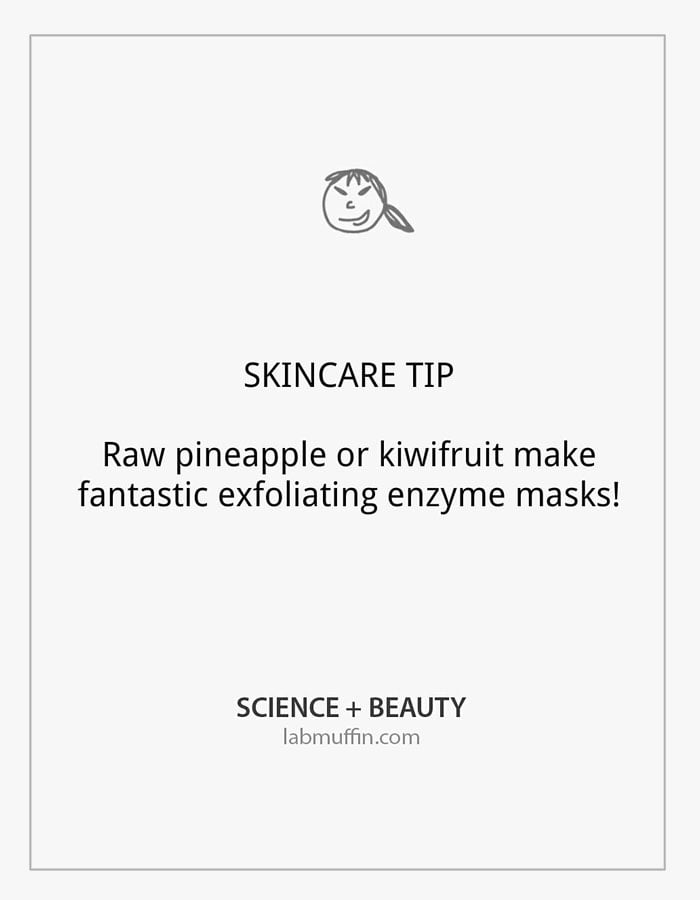
Some fruit (including pineapple, papaya and kiwifruit) contain protease enzymes which can break the proteins holding your dead skin cells together. I save kiwifruit peels to rub on my face before I shower! Make sure you’re not sensitive to the fruit you’re using, and wash it off thoroughly afterwards. (Extra tip: The canning process denatures the enzymes in pineapple, so you’ll have to use the fresh fruit.)
Related posts:
- The Essential Guide to Exfoliation
- How do enzyme exfoliants work?
- How to Exfoliate 2: All About Chemical Exfoliants
“Non-comedogenic” doesn’t mean anything
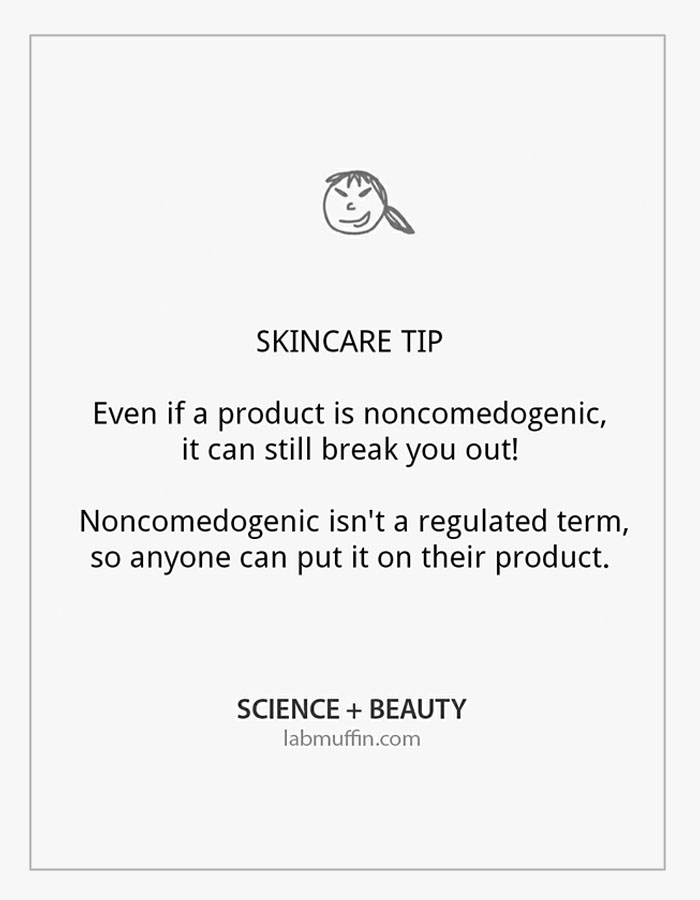
“Non-comedogenic” is the “supports immune function” of skincare marketing – it sounds scientific, but because it’s not regulated, anyone can put it on their product. Ideally a company will have tested the final product on human volunteers to check if it’s comedogenic before slapping the “non-comedogenic” label on a product, but that’s not always the case. Additionally, different people will react to different products, so there’s never a 100% guarantee. Always patch test new products if you’re breakout-prone!
Related posts:
SPF Moisturiser Can Be Used As Sunscreen
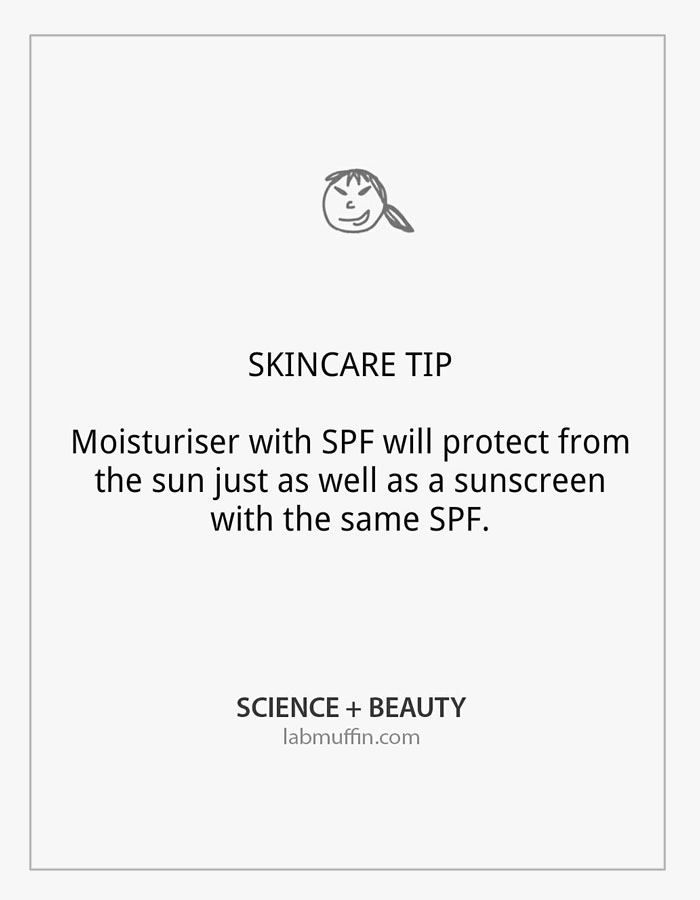
I’m not sure how the idea that a moisturiser with SPF doesn’t work as well as a sunscreen got started. As long as you’re using the same amount, they’ll give the same protection because legally, both undergo the same tests to get that SPF label! The key potential differences are just durability and whether they have broad spectrum protection – but these are always labelled.
Related posts:
If It’s Not Working, Change It Up
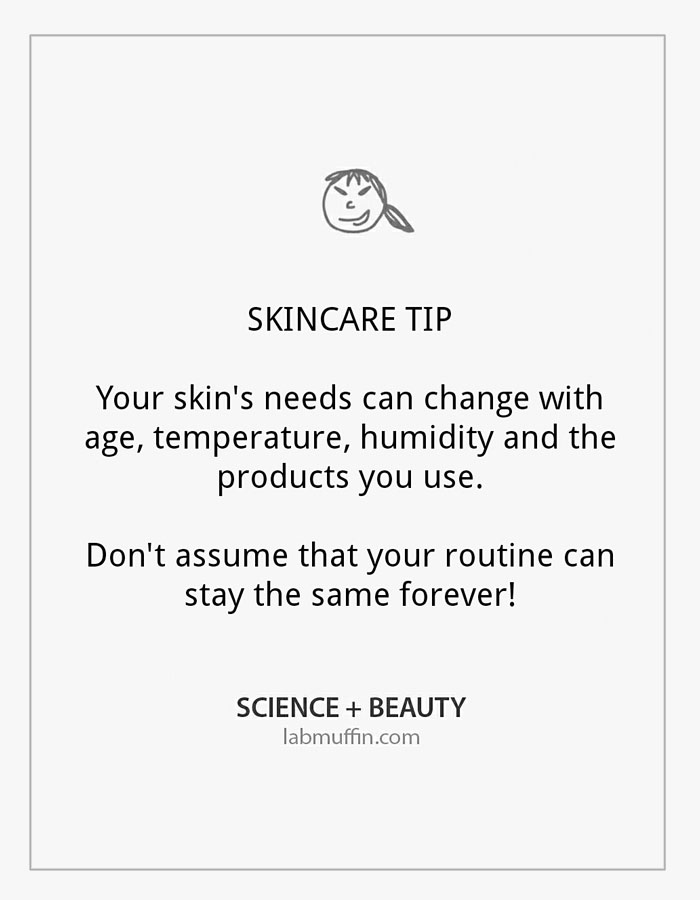
The condition of your skin – its hydration, sebum production and ability to exfoliate and repair itself – depends on many factors, including aging and the weather. You might need different products for summer or winter, if you move countries, as you get older, if you change your diet, or even if you change part of your skincare routine.


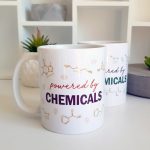
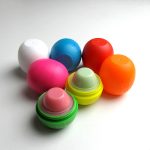
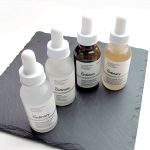
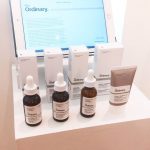
The skincare tips online make me shudder too. So much bi carb soda and lemon juice!
OMGosh yes! I wrote about Baking Soda recently as Biore played into the Pinterest love by releasing a baking soda cleanser – kinda confusing ‘eh 😉
Weirdly enough, I believe the cleanser actually has an acidic pH!
But then the same people turn around and say “why would you use something you’d use to clean your bathroom on your face” when they talk about SLS… :\
“it’s natural, so it’s good for you, even if it burns” is my #1 skin care pet peeve.
It’s very annoying! I think the whole “scrub away the dirty acne” idea is deeply ingrained into the beauty culture.
thank you , informative as always.
Yeah pinterest is frightening at times with all these claims of cancer cures etc but you have to take it with a pinch of salt i guess
I love getting design and recipe inspo on Pinterest but I can’t handle the skincare stuff!
Excellent post! Many high fives!
Thank you!
Consider them Pinned my friend! Even if you know enough about skincare to DIY, it’s the essential oils that worry me, what with the sun sensitivity and allergens. They smell so yummy that I can imagine Bisto gravy granny hands when it comes to scenting 😉
My skin isn’t sensitive, so I’m very lucky in that regard, but the recipes with tons of essential oils that are “perfect for sensitive skin” really worry me…
I’ve seen DIY sunscreen on pinterest which filled my heart with fear. I’m pinning all of these!
Oh yes! I actually have a whole post dedicated to those: https://labmuffin.com/2015/01/fact-check-dont-get-burnt-diy-sunscreen/ 🙂
I wash my face at the end of each day with a gentle cleanser (as gentle as I can find that also removes my makeup!), and in the morning I use micellar water. Hopefully that isn’t stripping my skin too much!
Thank you for these, pinning them now!
Great tips and I’m glad to see I’m not the only one who wants to cry when she sees those Pinterest tips. Every time I see a tip that tells you to put lemon juice on your skin, I just want to scream NOOOOOOOOOOOO! A while back, I read an article where some little girls were playing with limes from a tree in their yard. The next day, they had to be admitted to the ICU on morphine for pain management. I know it’s rare for phytophotodermatitis to be so severe, but someone has to be the “lucky” one who gets the rare cases and even milder cases can take a while to clear up. And yet people on Pinterest are telling you to douse your skin in lemon juice. I’ve actually cut down on the beauty and skin care stuff I follow on Pinterest because seeing the dangerous advice drives me nuts.
Yes, the lemon juice recipes make me cringe!
Really blown away by the Kiwi peel tip; it’s one of my favourite fruits, and I usually end up eating the peel!
Also really glad you mentioned the baking soda treatments being bogus. I always found the baking soda one particularly odd b/c usually I use baking soda to clean things in the kitchen (or even get stains out of clothes). I can’t imagine the kind of damage one could do by putting that stuff on their face… yikes.
Oh, I love these science based skincare tips. They’re all so true, I was nodding my head all throughout the article. Still, the most important is that it doesn’t take much sun to age us. I love that it’s the first tip on your list. Thank you!